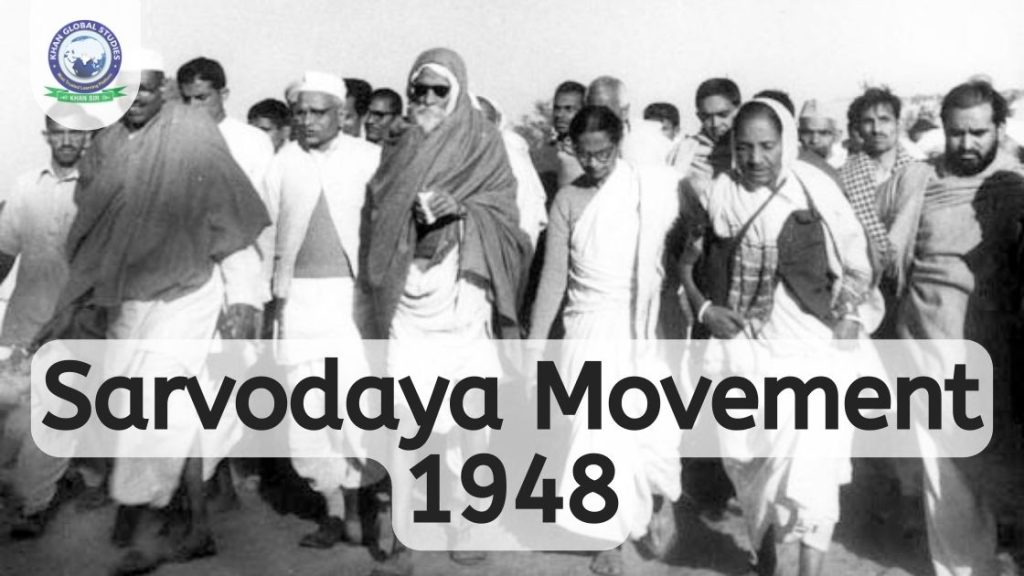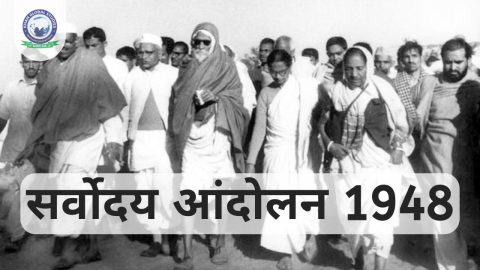The word “Sarvodaya” translates to “well-being of all” or “universal uplift”. It embodies the essence of a powerful social movement that emerged in India, advocating for social, economic, and moral progress through the principles of non-violence.
Objectives: A New India Built on Cooperation
While Mahatma Gandhi is recognized for sparking the concept of Sarvodaya, Acharya Vinoba Bhave became its leading proponent after India’s independence. The movement aimed to establish a new social order based on love and non-violence. It envisioned a society that functioned through cooperation, replacing “power politics” with a spirit of collective well-being.
Central to Sarvodaya’s objectives were:
- Uplifting All: The movement sought to bridge societal divides, advocating for the upliftment of both the rich and the poor. It rejected discrimination based on caste, religion, gender, or economic status.
- Non-Violent Transformation: Sarvodaya firmly believed in achieving social change through peaceful methods. It emphasized self-reliance, self-discipline, and the importance of individual transformation to create a just society.
- Decentralized Power: The movement envisioned a decentralized power structure, with Gram Swaraj (village self-rule) as its foundation. Local communities would hold autonomy over decision-making.
Significance: A Beacon of Equality and Harmony
The Sarvodaya movement’s significance lies in its emphasis on core human values:
- Equality and Dignity: Sarvodaya stressed the equal treatment of all individuals, fostering a society where everyone deserves respect and dignity.
- Non-Violent Conflict Resolution: By promoting non-violence as a tool for social change, Sarvodaya offered an alternative to violence and conflict.
- Community Building: The movement encouraged cooperation and mutual understanding, aiming to build strong and harmonious communities.
Impact: A Legacy of Inspiration
The Sarvodaya movement’s impact continues to be felt in various aspects of Indian society:
- Land Reforms: Vinoba Bhave’s Bhoodan (land gift) movement, inspired by Sarvodaya, encouraged voluntary land redistribution to address rural inequality.
- Social Service Organizations: Sarvodaya’s principles have influenced numerous social service organizations working at the grassroots level.
- Gandhi’s Legacy: Sarvodaya is a testament to Gandhi’s philosophy of non-violence and its potential to create positive social change.
Looking Ahead: Balancing Ideals with Reality
The Sarvodaya movement indeed has its challenges too. Given the complexities of the modern world, it is difficult to achieve complete gram swaraj or complete social equality. Moreover, the movement has also failed to address aspects of economic development.
However, despite these challenges, the core principles of Sarvodaya are still very important today. It is important to consider how we can apply these ideals in the modern context.
- Local solutions: The focus can be on empowering local communities and assisting them in finding solutions to their problems.
- Social entrepreneurship: The principles of Sarvodaya can be combined with social entrepreneurship, which can promote social welfare while earning profits.
- Non-violent conflict resolution: Conflicts still exist in today’s world. Sarvodaya’s approach to non-violent conflict resolution can help promote dialogue and cooperation.
The Sarvodaya movement shows us a path where social change can be brought about peacefully and sustainably. Although the ideals may be difficult to achieve, the basic principles of Sarvodaya – equality, cooperation and non-violence – will continue to guide our society towards a better future.
FAQs
Question: Who started the Sarvodaya Movement?
Answer: Acharya Vinoba Bhave (Started in March 1948).
Question: What is the Sarvodaya Movement?
Answer: Sarvodaya means ‘progress of all’ or ‘universal upliftment’. Gandhiji started this Sarvodaya movement and people consider it an additional part of his non-violence movement efforts. The main objective of this event was to establish a new India based on non-violence and love.
Question: Who introduced Sarvodaya?
Answer: Mahatma Gandhi in 1908.





